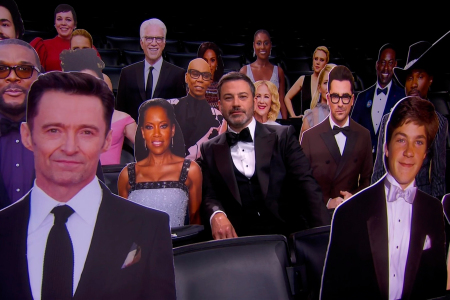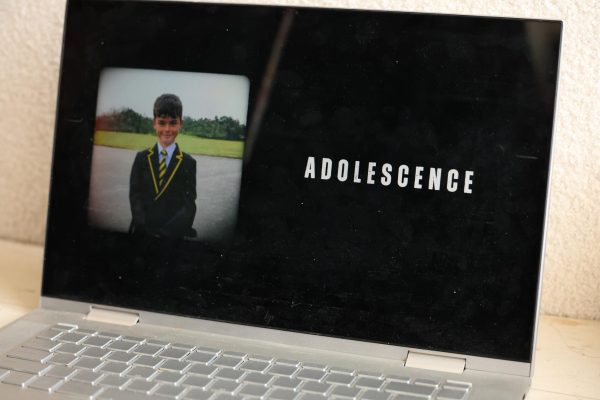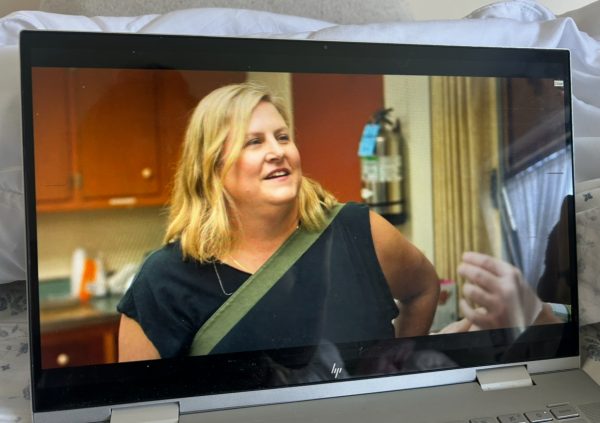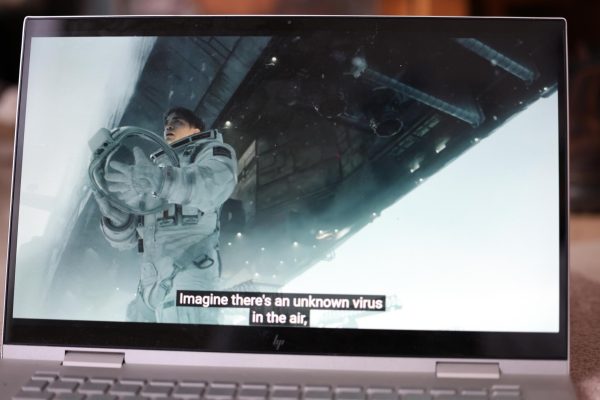Emmys Maintain Intimacy Despite the Distance

The 2020 Emmys featured cardboard cutouts of actors. (Courtesy of 2020 Invision)
With COVID-19 making packed red carpets and star-studded awards shows impossible, no one knew what this year’s Emmys would look like. Although it is not the first major event reimagined in light of the pandemic, the Emmys were arguably the most high-profile awards show to try to pull off a socially-distanced, virtual ceremony.
Unsurprisingly, the Emmys reflected what most of us have accepted as the new normal over the last six months — awkward Zoom calls with glitchy connections, mask-wearing and played-out COVID-19 jokes.
However, for the first few minutes of the show, it was as if we had time-traveled back to the good old days of 2019, when the only time the words “global pandemic” were uttered were in dystopian novels, and the idea of a virtual award show was something we would only see in a ridiculous “Saturday Night Live” skit.
Jimmy Kimmel, the ceremony’s host, initially seemed to be delivering a routine opening monologue to a packed audience. He welcomed everyone to the “Pand-Emmys” and spent his first few minutes making jokes about the frivolity of having an awards show in the middle of a pandemic.
“You know what they say,” he said. “You can’t have a virus without a host.”
However, Kimmel quickly revealed the cuts to the star-studded audience and the booming laughter and applause in response to his jokes were all fake, thanks to a seamless editing job using clips filmed from past awards shows. “Of course we don’t have an audience. This isn’t a MAGA rally,” Kimmel said to an empty Staples Center.
The seats weren’t completely empty, though. Taking a note from professional sports, the Emmys spread life-size cutouts of several nominees across the front rows to give some semblance of normalcy to the event that otherwise was anything but.
A few presenters, including Jennifer Aniston, Anthony Anderson and Tracee Ellis Ross, were also at the Staples Center with Kimmel. The rest of the audience, though, was only present virtually, with an enormous gallery of celebrities on a Zoom call being displayed on a wall of the arena.
The process the Emmys chose to give out awards added a sense of intimacy and authenticity that award shows are usually missing. We never would have expected to see presenters wearing tuxedo hazmat suits or stars accepting the highest degree of honor in television from the comfort of their homes, but somehow, this year’s Emmys were so much better than normal.
Award shows like the Emmys often drag on hours too long for both viewers at home and the celebrities in the arena. The show takes on an obligatory rather than celebratory tone, as stars pretend to laugh at bad jokes while waiting for their names to be called.
However, this year’s Emmys were different. The show brought out the human side of the stars that seems to only exist in the alternate universe of television, movies and social media. It felt like we were watching our favorite TV families come to life as casts and crews of shows with multiple nominations gathered together to celebrate their success.
The Emmys also did away with their traditional structure, in which they saved the top awards for the very end of the show. Instead, the show clustered all the awards in each genre together, so you weren’t left hanging until the very end to find out who won the awards that matter the most.
This new structure emphasized the sweep of all seven comedy awards that went to “Schitt’s Creek,” a show that had failed to secure any previous Emmys in its six-season history. Celebrating together at a watch party in a Canadian mansion, the cast took home awards for Outstanding Lead Actor in a Comedy Series (Eugene Levy), Lead Actress (Catherine O’Hara), Supporting Actor (Dan Levy), Supporting Actress (Annie Murphy), Writing, Directing and Outstanding Comedy Series. Despite this comedy sweep being the first in Emmys history, the cast stayed true to its humble roots.
“This has been the greatest experience of my life,” said Dan Levy. “This is completely overwhelming.”
After “Schitt’s Creek” dominated the show’s first hour, things got a little more competitive, although a few shows did take a handful of awards. “Watchmen” won big in the limited series category, taking home the top prize for Outstanding Limited Series as well as awards for actress Regina King and supporting actor Yahya Abdul-Mateen II.
In her acceptance speech, King wore a shirt honoring Breonna Taylor as she implored viewers to vote in the upcoming election and also paid tribute to the late Ruth Bader Ginsburg. Voting and racial justice were a common theme throughout the night, with many winners emphasizing the importance of voting this November and “Black-ish” star Anthony Anderson leading a “Black Lives Matter” chant.
“Succession” was the night’s other big winner, securing Outstanding Drama Series, Writing and Directing. Jeremy Strong also beat out his castmate Brian Cox for Outstanding Lead Actor in a Drama Series. “Succession” didn’t take a full sweep of the drama awards like “Schitt’s Creek” did, though. Billy Crudup won Outstanding Supporting Actor for his role in Apple’s “The Morning Show” and Julia Garner won for her role in “Ozark.”
Perhaps the night’s biggest surprise came when Zendaya made history by becoming the youngest Emmy winner for Outstanding Lead Actress in a Drama Series. At just 24 years old, Zendaya edged out the category’s other nominees, including Jennifer Aniston, Olivia Colman and Sandra Oh. The “Euphoria” star was visibly shaken as she accepted the award, thanking the other women in her category and saying she was inspired by others her age who were working to make a difference in the world.
Some other notable winners of the night were “Saturday Night Live” for Outstanding Variety Sketch Series, John Oliver’s “Last Week Tonight” for Outstanding Variety Talk Series and “RuPaul’s Drag Race” for Outstanding Reality Competition series.
While this year’s Emmys weren’t necessarily proof that every awards show should be a giant Zoom call, it was a solid argument for reducing the pomp and circumstance that generally characterize the ceremony. One day the crowds will return, but this year’s Emmys prove it doesn’t hurt to replace the glaring lights of the stage with the soft glow of personal ring lights.












































































































































































































